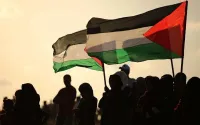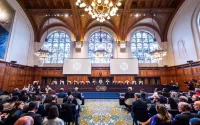14 July 2007Maria Ermakova
Russian President Vladimir Putin suspended an arms treaty with NATO that limits the deployment of conventional forces across Europe, citing concerns that the agreement undermines Russia's security.
The president signed a decree today suspending participation in the Treaty on Conventional Armed Forces in Europe, according to a statement from the presidential press service. The agreement originally sought to balance the conventional forces of the North Atlantic Treaty Organization and the Soviet-led Warsaw Pact.
The 1990 accord was suspended ``due to exceptional circumstances, in relation to the treaty's content, that affect the security of the Russian Federation and require immediate measures,'' Putin said in the statement.
Russia has objected to the eastward expansion of NATO and Putin has also denounced U.S. plans to put a radar station and 10 interceptor missiles in former Soviet satellite states. The U.S. says the new missile shield is needed to counter a threat of attacks from Iran.
``We're disappointed Russia has suspended its participation for now, but we'll continue to have discussions with them in the coming months on the best way to proceed in this area, that is in the interest of all parties involved and provides for security in Europe,'' Blair Jones, a spokesman for the White House, said in an e-mail.
The Treaty on Conventional Armed Forces in Europe was amended in 1999 and ratified by Russia, Belarus and Kazakhstan. NATO has yet to do so.
`Hopelessly Outmoded'
``The agreement in its present form is hopelessly outmoded,'' Deputy Foreign Minister Sergei Kislyak said today on state-owned television channel Rossiya. ``There is neither a Soviet Union nor Warsaw Pact today. NATO continues to expand, going beyond the limits defined in the agreement.''
Russia will no longer provide information nor allow or carry out treaty-related military inspections, Kislyak said. The suspension may also mean an arms build-up in the European part of Russia, Anatoly Antonov, disarmament chief in Russia's Foreign Ministry, said last month.
``NATO regrets this decision because it considers the Treaty on Conventional Armed Forces in Europe a cornerstone of European security,'' James Appathurai, spokesman for NATO, said in a statement today.
The European Commission, the European Union's executive arm, won't comment on the suspension, a Brussels-based spokesman for the body said by phone today.
Putin's decree will become active 150 days after other participants in the accord are formally notified, according to today's statement.
``In practice everything will depend on the military and political situation and, most of all, on the partners' commitment to show military restraint,'' Kislyak said. ``We submitted proposals for resolving the situation. We are still waiting for a constructive reaction.''
To contact the reporter on this story: Maria Ermakova in Moscow at [email protected] .
http://www.bloomberg.com/apps/news?pid=20601085&sid=aNBWrjM4kbhY#






